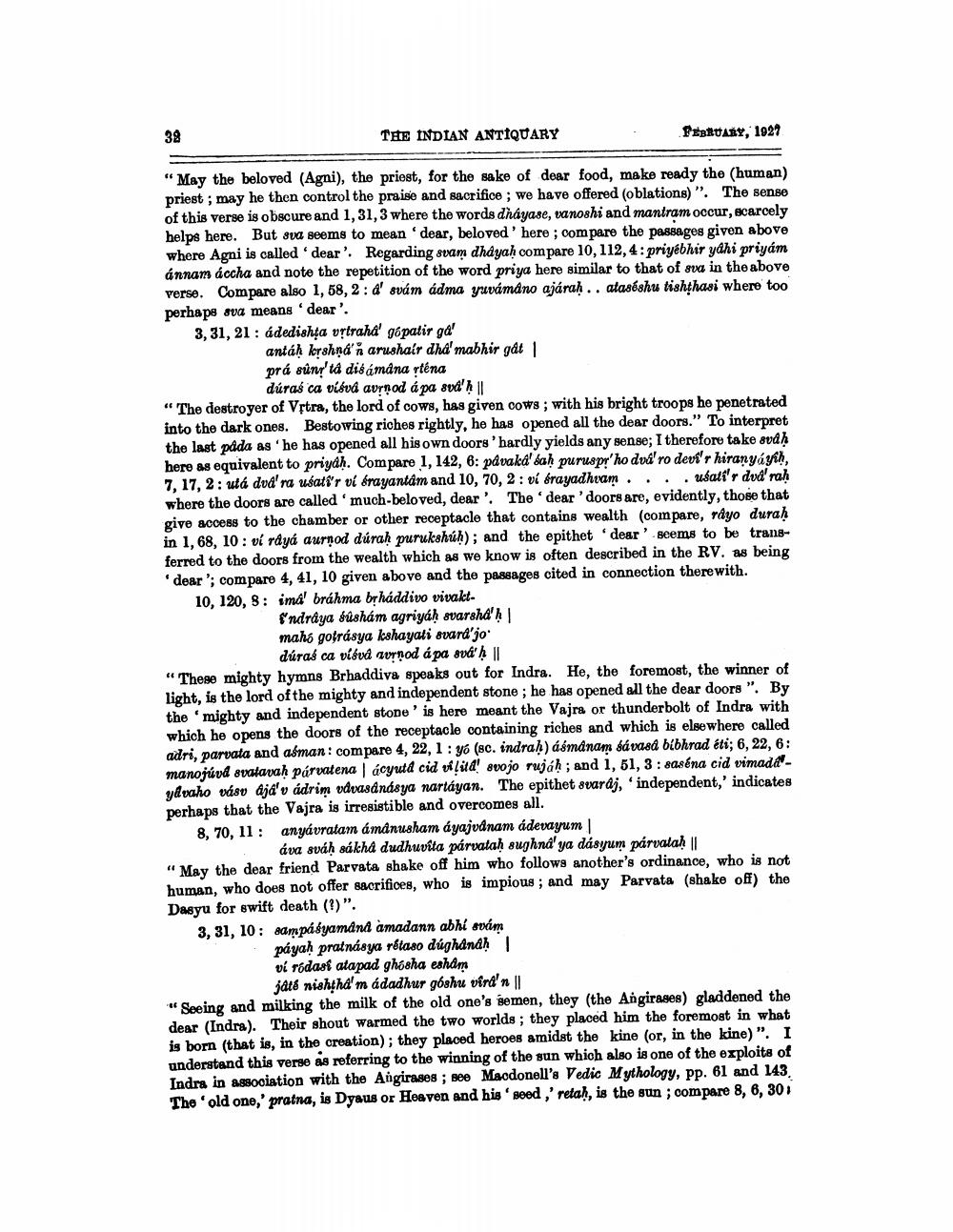________________
38
THE INDIAN ANTIQUARY
FEBRUARY, 1927
"May the beloved (Agni), the priest, for the sake of dear food, make ready the human) priest ; may he then control the praise and sacrifice; we have offered (oblations)". The sense of this verse is obscure and 1, 31, 3 where the words dnayase, vanoshi and mantram occur, scarcely helps here. But sva seems to mean 'dear, beloved' here ; compare the passages given above where Agni is called 'dear'. Regarding svam dháyah compare 10, 112, 4: priyébhir ydhi priyam ánnam áccha and note the repetition of the word priya here similar to that of sva in the above verse. Compare also 1, 58, 2: d' svám ádma yuvámáno ajárah.. atasóshu tishthasi where too perhaps sva means 'dear'. 3, 31, 21 : ádedishţa vrtraha' gópatir ga!
antákrahna'n arushair dha' mabhir gat 1 prá súny tá dis ámdna rténa
dúras ca visvá avrnod á pa svd's || “The destroyer of Vftra, the lord of cows, has given cows; with his bright troops he penetrated into the dark ones. Bestowing riches rightly, he has opened all the dear doors." To interpret the last pada as 'he has opened all his own doors 'hardly yields any sense; I therefore take avdḥ here as equivalent to priyaḥ. Compare 1, 142, 6: pdvaka' bah puruspy' hodvá' ro devi'r hiranyáyih, 7, 17, 2: utá dvd'ra usati'r vi brayantám and 10, 70, 2: ví drayadhvam... usati'r dvd' rah where the doors are called 'much-beloved, dear'. The dear 'doors are, evidently, those that give access to the chamber or other receptacle that contains wealth (compare, rdyo duraḥ in 1, 68, 10: vi rdyá aurnod dúrah purukshúh); and the epithet 'dear' seems to be transferred to the doors from the wealth which as we know is often described in the RV. as being 'dear'; compare 4, 41, 10 given above and the passages cited in connection there with. 10, 120, 8: ima' bráhma brháddivo vivakt.
Andraya busham agriyah svarsha') mahs gofrásya kshayati svard'jo
dúraś ca visvd avrnod á pa sváth || "There mighty hymns Brhaddiva speaks out for Indra. He, the foremost, the winner of light, is the lord of the mighty and independent stone; he has opened all the dear doors". By the mighty and independent stone'is here meant the Vajra or thunderbolt of Indra with which he opens the doors of the receptacle containing riches and which is elsewhere called adri, parvata and asman: compare 4, 22, 1: yó (sc. indrah) áśmånam sávasd bibhrad éti; 6, 22, 6: manojúvd svatavah párvatena | ácyutd cid u lidl svojo rujáh; and 1, 51, 3: saséna cid vimada - ydvaho vásv ajá'v ádrim vdvasdnásya nartáyan. The epithet svaraj, 'independent,' indicates perhaps that the Vajra is irresistible and overcomes all. 8, 70, 11: anyávratam ámdnusham ayajvdnam adevayum
áva sváh sákha dudhuvita párvatah sughna' ya dásyum párvatah || "May the dear friend Parvata shake off him who follows another's ordinance, who is not human, who does not offer sacrifices, who is impious; and may Parvata (shake off the Dasyu for swift death (?)". 3, 31, 10: sampásyamdnd amadann abhi svim
payah pratnásya rétaso dúghanah vi rodasi atapad ghosha esham
jate nishtha' m adadhur góshu vira'n || " Seeing and milking the milk of the old one's gemen, they (the Angirases) gladdened the dear (Indra). Their shout warmed the two worlds; they placed him the foremost in what is born (that is, in the creation); they placed heroes amidst the kine (or, in the kine)". I understand this verse As referring to the winning of the sun which also is one of the exploits of Indra in association with the Angirases ; see Maodonell's Vedic Mythology, pp. 61 and 143 The old one,' pratna, is Dyaus or Heaven and his 'seed,' reta), is the sun ; compare 8, 6, 30




